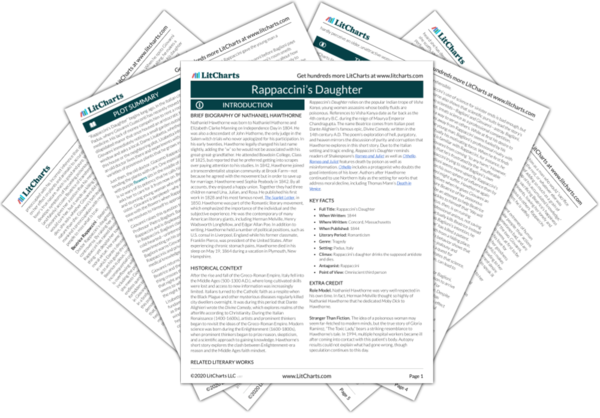Giovanni Guasconti Quotes in Rappaccini’s Daughter
Rappaccini’s Daughter Quotes
It was strangely frightful to the young man’s imagination to see this air of insecurity in a person cultivating a garden, that most simple and innocent of human toils, and which had been alike the joy and labor of the unfallen parents of the race. Was this garden, then, the Eden of the present world? And this man, with such a perception of harm in what his own hands caused to grow,—was he the Adam?
Giovanni knew not what to dread; still less did he know what to hope; yet hope and dread kept a continual warfare in his breast, alternately vanquishing one another and starting up afresh to renew the contest. Blessed are all simple emotions, be they dark or bright! It is the lurid intermixture of the two that produces the illuminating blaze of the infernal regions.
For some purpose or other, this man of science is making a study of you. I know that look of his! It is the same that coldly illuminates his face as he bends over a bird, a mouse, or a butterfly, which, in pursuance of some experiment, he has killed by the perfume of a flower; a look as deep as Nature itself, but without Nature’s warmth of love. Signor Giovanni, I will stake my life upon it, you are the subject of one of Rappaccini’s experiments!
“I do so bid you, signor,” she replied. “Forget whatever you may have fancied in regard to me. If true to the outward senses, still it may be false in its essence; but the words of Beatrice Rappaccini’s lips are true from the depths of the heart outward. Those you may believe.”
At such times he was startled at the horrible suspicions that rose, monster-like, out of the caverns of his heart and stared him in the face; his love grew thin and faint as the morning mist, his doubts alone had substance. But, when Beatrice’s face brightened again after the momentary shadow, she was transformed at once from the mysterious, questionable being whom he had watched with so much awe and horror; she was now the beautiful and unsophisticated girl whom he felt that his spirit knew with a certainty beyond all other knowledge.
“I have been reading an old classic author lately,” said he, “and met with a story that strangely interested me. Possibly you may remember it. It is of an Indian prince, who sent a beautiful woman as a present to Alexander the Great. She was as lovely as the dawn and gorgeous as the sunset; but what especially distinguished her was a certain rich perfume in her breath—richer than a garden of Persian roses. Alexander, as was natural to a youthful conqueror, fell in love at first sight with this magnificent stranger; but a certain sage physician, happening to be present, discovered a terrible secret in regard to her.”
It is not yet too late for the rescue. Possibly we may even succeed in bringing back this miserable child within the limits of ordinary nature, from which her father’s madness has estranged her.
It was now the customary hour of his daily interview with Beatrice. Before descending into the garden, Giovanni failed not to look at his figure in the mirror,—a vanity to be expected in a beautiful young man, yet, as displaying itself at that troubled and feverish moment, the token of a certain shallowness of feeling and insincerity of character. He did gaze, however, and said to himself that his features had never before possessed so rich a grace, nor his eyes such vivacity, nor his cheeks so warm a hue of superabundant life.
Incapable as he was of such high faith, still her presence had not utterly lost its magic. Giovanni’s rage was quelled into an aspect of sullen insensibility. Beatrice, with a quick spiritual sense, immediately felt that there was a gulf of blackness between them which neither he nor she could pass.
“Yes, poisonous thing!” repeated Giovanni, beside himself with passion. “Thou hast done it! Thou hast blasted me! Thou hast filled my veins with poison! Thou hast made me as hateful, as ugly, as loathsome and deadly a creature as thyself—a world’s wonder of hideous monstrosity! Now, if our breath be happily as fatal to ourselves as to all others, let us join our lips in one kiss of unutterable hatred, and so die!”
Ought not, then the desert of humanity around them to press this insulated pair closer together? If they should be cruel to one another, who was there to be kind to them? Besides, thought Giovanni, might there not still be a hope of his returning within the limits of ordinary nature, and leading Beatrice, the redeemed Beatrice, by the hand? O, weak, and selfish, and unworthy spirit, that could dream of an earthly union and earthy happiness as possible, after such deep love had been so bitterly wronged as was Beatrice’s love by Giovanni’s blighting words! No, no; there could be no such hope. She must pass heavily, with that broken heart, across the borders of Time—she must bathe her hurts in some fount of paradise, and forget her grief in the light of immortality, and there be well.
As he drew near, the pale man of sciences seemed to gaze with a triumphant expression at the beautiful youth and maiden, as might an artist who should spend his life in achieving a picture or a group of statuary and finally be satisfied with his success. He paused; his bent form grew erect with conscious power; he spread out his hands over them in the attitude of a father imploring a blessing upon his children; but those were the same hands that had thrown poison into the stream of their lives. Giovanni trembled. Beatrice shuddered nervously, and pressed her hand upon her heart.












